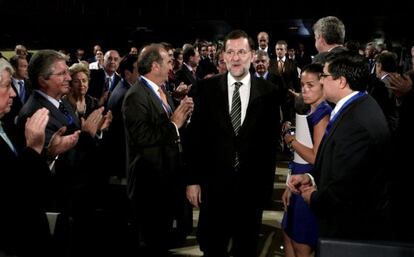Rajoy warns of “difficult” reforms still to come
Employers association calls for further government action

Prime Minister Mariano Rajoy announced on Monday that more economic reforms are to come, but did not go into any further detail. Speaking at a meeting of the country’s largest employers association, the CEOE, he said that these reforms would be “difficult” and would arrive “soon, before the end of the year.” He also said that the government was willing to “correct what needs to be corrected and reform what needs reforming.”
During his speech, Rajoy called for decisions to be taken by European Union countries on the measures that are necessary to save the euro and deal with the banking and sovereign debt crisis. “The political message must be emphatic and the calendar for integration needs to be clear,” he said, after stating that one of his objectives was the creation of “a joint European agency for debt and issues.” In other words, eurobonds.
Before speaking at the meeting, the head of the CEOE, Juan Rosell, took the floor. The business leader used the opportunity to call on the government to go even further than it already has with reforms to the labor market. A wide-ranging change to the laws — which, among other things, has made the cost to businesses of sacking employees cheaper — will be signed off by Congress this week.
Rosell used the example of Germany, where Chancellor Schröder carried out labor reforms in four phases between 2002 and 2005.
“While the labor reforms have been far reaching, and they are the first measures to be taken, we have to evaluate their impact with a view to continued reforms,” he said. “We need to make the Spanish labor market one of the most flexible in Europe.”
The business leader also sought to play down the problem of unemployment in Spain, which is currently running at 24.3 percent. “When we talk about Spain, and we compare it with other countries, it would be good if we made a few observations: firstly that our figures include the early-retired as unemployed; secondly, that the use of part-time contracts here is half the figure in Germany; thirdly, that the rate of women in work has risen 18 points in 30 years; fourth, that of the 10 million foreigners who entered the EU 15 [the euro countries] between 1998 and 2008, 50 percent of them came to Spain.”
Rosell also called on his fellow CEOE members to do their part by leading the way when it comes to collective bargaining with employees. “It’s one of the major commitments that the CEOE and its organizations must assume,” he said.
Tu suscripción se está usando en otro dispositivo
¿Quieres añadir otro usuario a tu suscripción?
Si continúas leyendo en este dispositivo, no se podrá leer en el otro.
FlechaTu suscripción se está usando en otro dispositivo y solo puedes acceder a EL PAÍS desde un dispositivo a la vez.
Si quieres compartir tu cuenta, cambia tu suscripción a la modalidad Premium, así podrás añadir otro usuario. Cada uno accederá con su propia cuenta de email, lo que os permitirá personalizar vuestra experiencia en EL PAÍS.
¿Tienes una suscripción de empresa? Accede aquí para contratar más cuentas.
En el caso de no saber quién está usando tu cuenta, te recomendamos cambiar tu contraseña aquí.
Si decides continuar compartiendo tu cuenta, este mensaje se mostrará en tu dispositivo y en el de la otra persona que está usando tu cuenta de forma indefinida, afectando a tu experiencia de lectura. Puedes consultar aquí los términos y condiciones de la suscripción digital.









































